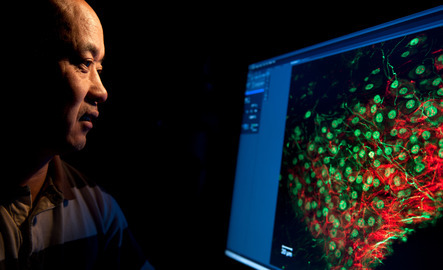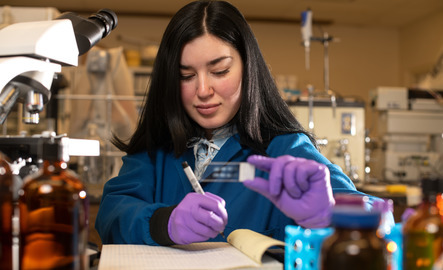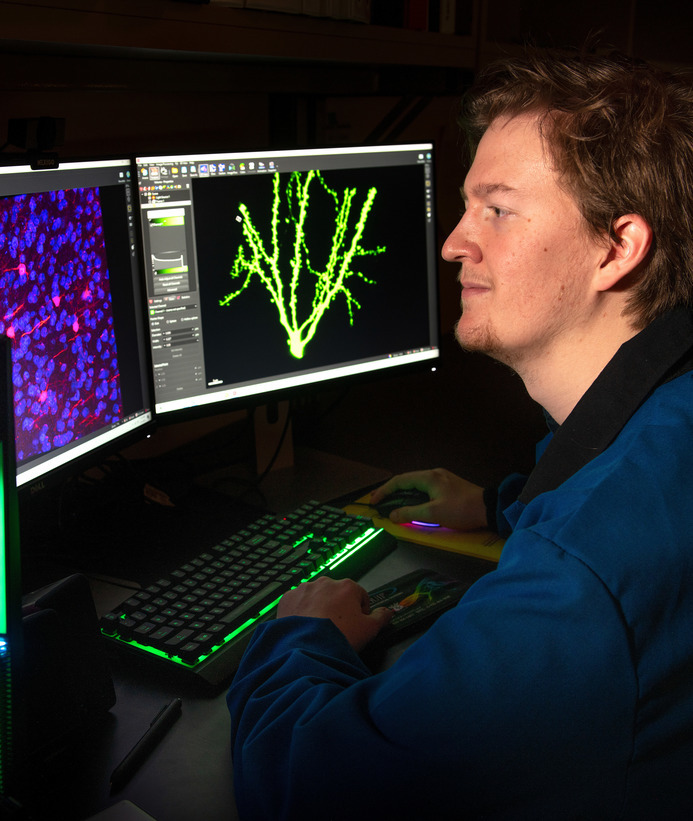What can you expect from UW’s Ph.D. in neuroscience program?
The interdisciplinary neuroscience Ph.D. program at UW offers a broad, research-based
degree with a problem-oriented approach. You’ll gain hands-on scientific and experimental
training using a variety of techniques and analytic tools to sharpen your job skills
in research and communication, scientific writing, teaching and leadership.
Our neuroscience Ph.D. program is personalized as much as possible to prepare you
for your desired career path, including post-doctoral fellowships and research fellowships
that open up opportunities for lab research, teaching and medical scientist jobs.

With a commitment to helping graduate students find funding to cover tuition and other program costs, UW’s Ph.D. in neuroscience program is supported through faculty grants, university stipends, graduate assistantships and program funds. These are some common graduate student opportunities for financial support:
- Graduate teaching assistantships
- Graduate research assistantships
- Grant funding, such as NIH grants, including the Sensory Neurobiology COBRE grant

What Can You Do With a Neuroscience Doctoral Degree?
At UW, we prepare you to enter the job market with a Ph.D. in neuroscience as a research scientist in academia or with a private company or as a teacher. Or, you can continue your studies with a post-doctoral fellowship that will help you qualify for additional jobs with greater research emphasis in academia and the private sector.
- Neuroscientist or research scientist (academic, clinical or industry labs)
- University professor or lecturer
- Pharmaceutical or biotech R&D specialist
- Medical science liaison
- Data scientist or neuroinformatics specialist
- Science policy advisor or grant administrator
- Neuroscience writer or science communicator
- Director of research or lab manager
- Cognitive neuroscientist or behavioral analyst
- Clinical trial manager or coordinator
UW's neuroscience program has been very successful in placing its graduates. We have graduated students who have faculty positions at:
- The Ohio State University
- University of Utah Medical School
- Columbia University Medical School
- Texas Christian University
- University of Mississippi Medical School
- Indiana University Medical School
- University of South Florida Medical School
- Montana State University
- Middlebury College
- Louisiana State University
- Colorado State University
- University of California - Riverside
- Harding University
Graduates have also been successful in obtaining NIH individual postdoctoral fellowships prior to moving to regular faculty positions.
We have many former students working for major companies, such as:
- Glaxo Pharmaceuticals
- Grey Matters International
- LifeX Labs
- The National Institute on Drug Abuse
- And more!
Studying neuroscience in Wyoming means access to cutting-edge research opportunities alongside the tranquility and inspiration of the state’s stunning natural landscape. From the new Sensory Biology Center to collaborative, NIH-funded projects, you’ll be part of meaningful scientific work that explores how the brain and nervous system function. Outside the lab, Wyoming offers easy access to world-class outdoor spaces like Curt Gowdy State Park, Yellowstone National Park and Grand Teton National Park—giving you the balance of rigorous academic training and a healthy, adventure-filled lifestyle.
Hands-On Research, Real-World Impact
The University of Wyoming offers neuroscience Ph.D. students a rare chance to dive into high-impact research through its Sensory Biology Center. Under the direction of Dr. Qian-Quan Sun, the center unites faculty across disciplines to explore how sensory systems shape brain function and behavior. Research spans critical areas like neurological disorders, sensory processing and pain management, giving students the chance to work on projects that bridge basic science and real-world applications. At UW, you'll be part of a collaborative environment pushing the boundaries of brain science.
"The University of Wyoming (UW) provided me with a world-class education and gave me all the tools I needed to pursue any life path and career ambitions. UW has a very strong community, and I always felt supported both personally and professionally. At UW, I made life-long relationships with great mentors, colleagues and friends. I am very fortunate to have had the opportunity to attend UW for both my undergraduate and graduate education, and I would do it all over again if I could."
- Ali Hamodi | Ph.D. ’16 | Current Postdoctoral Associate at the Department of Neuroscience, Yale School of Medicine


